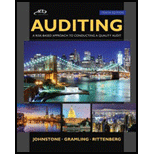
Auditing: A Risk Based-Approach to Conducting a Quality Audit
10th Edition
ISBN: 9781305080577
Author: Karla M Johnstone, Audrey A. Gramling, Larry E. Rittenberg
Publisher: South-Western College Pub
expand_more
expand_more
format_list_bulleted
Question
Chapter 2, Problem 44RSCQ
a.
To determine
Introduction:Corporate governance is the medium through which various stakeholders of an organization can exercise control and demand for accountability from the organization to which the general public entrusts the resources.
To identify:The major parties that are involved in the corporate governance process.
b.
To determine
Introduction:Corporate governance is the medium through which various stakeholders of an organization can exercise control and demand for accountability from the organization to which the general public entrusts the resources.
To identify:The roles performed by each party who is involved in corporate governance.
Expert Solution & Answer
Want to see the full answer?
Check out a sample textbook solution
Students have asked these similar questions
Correct Answer
Provide correct answer?
Greenfield Industries sells a product for $80 per unit. Variable costs
per unit are $50, and monthly fixed costs are $400,000.
What unit sales would be required to earn a target profit of
$260,000?
a) 18,000 units
b) 22,000 units
c) 21,000 units
d) 19,000 units
Chapter 2 Solutions
Auditing: A Risk Based-Approach to Conducting a Quality Audit
Ch. 2 - The Great Salad Oil Swindle of 1963 is an asset...Ch. 2 - Prob. 2TFQCh. 2 - The three elements of the fraud triangle include...Ch. 2 - Prob. 4TFQCh. 2 - Prob. 5TFQCh. 2 - Prob. 6TFQCh. 2 - Prob. 7TFQCh. 2 - Prob. 8TFQCh. 2 - Prob. 9TFQCh. 2 - Prob. 10TFQ
Ch. 2 - Prob. 11TFQCh. 2 - Prob. 12TFQCh. 2 - Prob. 13MCQCh. 2 - Prob. 14MCQCh. 2 - Prob. 15MCQCh. 2 - Prob. 16MCQCh. 2 - Prob. 17MCQCh. 2 - Prob. 18MCQCh. 2 - Prob. 19MCQCh. 2 - Prob. 20MCQCh. 2 - Prob. 21MCQCh. 2 - Prob. 22MCQCh. 2 - Prob. 23MCQCh. 2 - Prob. 24MCQCh. 2 - Prob. 25RSCQCh. 2 - Prob. 26RSCQCh. 2 - Prob. 27RSCQCh. 2 - Refer to Exhibit 2.1 a. What is a Ponzi scheme? b....Ch. 2 - Prob. 29RSCQCh. 2 - Prob. 30RSCQCh. 2 - Prob. 31RSCQCh. 2 - Prob. 32RSCQCh. 2 - Prob. 33RSCQCh. 2 - Prob. 34RSCQCh. 2 - Prob. 35RSCQCh. 2 - Prob. 36RSCQCh. 2 - Prob. 37RSCQCh. 2 - Prob. 38RSCQCh. 2 - Many consider the Enron fraud to be one of the...Ch. 2 - Prob. 40RSCQCh. 2 - Prob. 41RSCQCh. 2 - Refer to Exhibit 2.5 and answer the following...Ch. 2 - Prob. 43RSCQCh. 2 - Prob. 44RSCQCh. 2 - Prob. 45RSCQCh. 2 - Prob. 46RSCQCh. 2 - Prob. 47RSCQCh. 2 - Prob. 48RSCQCh. 2 - Prob. 49RSCQCh. 2 - Prob. 50FFCh. 2 - Prob. 51FFCh. 2 - Prob. 52FF
Knowledge Booster
Similar questions
- Total overhead variance isarrow_forwardThe UPS Manufacturing Company has a predetermined overhead rate of $10, comprised of a variable overhead rate of $6 and a fixed rate of $4. The amount of budgeted overhead costs at normal capacity of $300,000 was divided by normal capacity of 30,000 direct labor hours, to arrive at the predetermined overhead rate of $10. Actual overhead for July was $18,600 variable and $12,500 fixed, and standard hours allowed for the product produced in July was 3,500 hours. The total overhead variance is__.arrow_forward4 POINTSarrow_forward
arrow_back_ios
SEE MORE QUESTIONS
arrow_forward_ios
Recommended textbooks for you
 Auditing: A Risk Based-Approach (MindTap Course L...AccountingISBN:9781337619455Author:Karla M Johnstone, Audrey A. Gramling, Larry E. RittenbergPublisher:Cengage LearningPrinciples of Accounting Volume 2AccountingISBN:9781947172609Author:OpenStaxPublisher:OpenStax College
Auditing: A Risk Based-Approach (MindTap Course L...AccountingISBN:9781337619455Author:Karla M Johnstone, Audrey A. Gramling, Larry E. RittenbergPublisher:Cengage LearningPrinciples of Accounting Volume 2AccountingISBN:9781947172609Author:OpenStaxPublisher:OpenStax College Intermediate Financial Management (MindTap Course...FinanceISBN:9781337395083Author:Eugene F. Brigham, Phillip R. DavesPublisher:Cengage Learning
Intermediate Financial Management (MindTap Course...FinanceISBN:9781337395083Author:Eugene F. Brigham, Phillip R. DavesPublisher:Cengage Learning Auditing: A Risk Based-Approach to Conducting a Q...AccountingISBN:9781305080577Author:Karla M Johnstone, Audrey A. Gramling, Larry E. RittenbergPublisher:South-Western College PubBusiness/Professional Ethics Directors/Executives...AccountingISBN:9781337485913Author:BROOKSPublisher:Cengage
Auditing: A Risk Based-Approach to Conducting a Q...AccountingISBN:9781305080577Author:Karla M Johnstone, Audrey A. Gramling, Larry E. RittenbergPublisher:South-Western College PubBusiness/Professional Ethics Directors/Executives...AccountingISBN:9781337485913Author:BROOKSPublisher:Cengage Cornerstones of Cost Management (Cornerstones Ser...AccountingISBN:9781305970663Author:Don R. Hansen, Maryanne M. MowenPublisher:Cengage Learning
Cornerstones of Cost Management (Cornerstones Ser...AccountingISBN:9781305970663Author:Don R. Hansen, Maryanne M. MowenPublisher:Cengage Learning

Auditing: A Risk Based-Approach (MindTap Course L...
Accounting
ISBN:9781337619455
Author:Karla M Johnstone, Audrey A. Gramling, Larry E. Rittenberg
Publisher:Cengage Learning

Principles of Accounting Volume 2
Accounting
ISBN:9781947172609
Author:OpenStax
Publisher:OpenStax College

Intermediate Financial Management (MindTap Course...
Finance
ISBN:9781337395083
Author:Eugene F. Brigham, Phillip R. Daves
Publisher:Cengage Learning

Auditing: A Risk Based-Approach to Conducting a Q...
Accounting
ISBN:9781305080577
Author:Karla M Johnstone, Audrey A. Gramling, Larry E. Rittenberg
Publisher:South-Western College Pub

Business/Professional Ethics Directors/Executives...
Accounting
ISBN:9781337485913
Author:BROOKS
Publisher:Cengage

Cornerstones of Cost Management (Cornerstones Ser...
Accounting
ISBN:9781305970663
Author:Don R. Hansen, Maryanne M. Mowen
Publisher:Cengage Learning